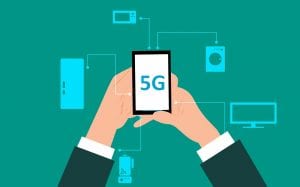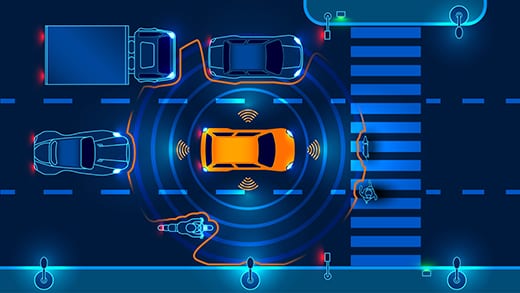There is growing enthusiasm for telecom operators to play a bigger role in the creation and management of Smart Cities, and one major factor driving the market going forward will be the introduction of 5G services.
At least 25 operators will deploy 5G commercial services in 2019 around the world, and Smart City services are a very high priority for some of the world’s leading telcos.
5G will represent a key turning point in the evolution of Smart Cities as high-speed connectivity, low-latency, better battery life and the ability to handle a massive number of connections will all create new potential services.
When 5G networks are coupled with new software such as Artificial Intelligence services and new hardware such as robots and drones the possibilities for new revenue generation will expand even further.
5G services will enhance a variety of smart city use cases including education, healthcare and energy but the three sectors that are the current major areas of focus in the market are the transportation, public safety and security and citizen services sectors.
The upcoming GSM Association Mobile World Congress in Barcelona will be a major forum to discuss 5G developments and strategies, and the 5G Smart City is expected to be a major theme of the event.
Transportation
Improving transportation systems using 5G is the biggest area of focus in the market currently in terms of Smart City services and one of the most aggressive telcos in the world in terms of developing 5G traffic management systems is Verizon Wireless in the USA.
The company is deploying a traffic management system in the city of Sacramento, California which will see IoT sensors deployed inside of pavement and on streetlights in order to provide better information to local authorities on traffic flow.
Verizon believes that it can reduce car idle time by 44% by deploying the system which will also reduce CO2 emissions.
Verizon and the City of Sacramento signed an innovative partnership deal for 5G services which will allow the company to use city infrastructure for free for ten years and fast-track permits for 5G to ensure a fast and cost effective network rollout.
In return for the use of city infrastructure, Verizon agreed among other things to provide free public Wi-Fi in selected areas of the city such as in parks and in major pedestrian thoroughfares.
Intelligent transportation management systems are just the start of how 5G will revolutionize Smart City services.
Eventually once 5G networks are deployed on a nationwide basis, fully autonomous cars and V2X communication services will also become commonplace and will totally transform the transportation industry.
One interesting demonstration of the 5G-powered transportation services expected in the future was recently shown in the nation of Qatar.
Incumbent operator Ooredoo demonstrated the world’s first autonomous flying taxi which is controlled by 5G.
The drone-like vehicle can hold two passengers and is capable of flying at speeds of up to 130 kilometers per hour for up to 20 minutes.
The vehicle is controlled using the telco’s 5G network and hence has no driver and can easily bypass traffic congestion and other obstacles to create a more efficient form of transportation.
Public Safety & Security
5G will also significantly enhance Smart City services related to public safety and security.
Real-time analytics of video recordings of public venues coupled with biometric software will be able to quickly identify dangerous situations and alert authorities automatically in situations like a car accident or terrorist attack.
Unlike the CCTV systems in place today, 5G-enabled equipment will be able to be updated over-the-air and data management platforms will interconnect various services.
5G connected equipment will also be able to be deployed anywhere with mobile network coverage eliminating the need for fixed wiring and will be extended to mobile form factors such as drones and robots.
In Japan mobile operator NTT Docomo has partnered with ALSOK, a leading provider of physical security services and Japanese IT vendor NEC to demonstrate the potential of 5G.
The three companies held a trial where 5G was used to capture high-resolution images on CCTV cameras, drones, gates and portable devices for security guards.
NEC then combined these images with their crowd recognition, facial recognition and AI services in order to provide real time security monitoring to provide an advanced security solution.
Citizen Services
Another area which will significantly benefit from the introduction of 5G services is the area of citizen services, as ultra-fast mobile connectivity will create significant benefits to industries such as healthcare.
In the UK, mobile operator O2 has estimated that using 5G-enabled telemedicine could reduce patient visit to National Health Service offices by 9.4 million per year and save 1.3 billion pounds per year in lost workplace productivity.
By offering high definition remote telemedicine services elderly and disabled patients will also have a considerably less physical burden and patients in remote areas will be able to save a significant amount of time and money on travel costs.
Specialized services over 5G will also significantly improve the quality of life for disabled citizens.
In the United States some airports are offering blind passengers smart glasses which have a remote video connection to help them navigate the airport terminal.
In Japan a recent demonstration of a café in Tokyo used robots which are remote controlled by disabled people to serve as waiters, creating gainful employment for people who are not able to walk.
5G connectivity will considerably improve the functionality of such services in the future.
Conclusions
In the coming year 5G services will start to emerge as a power tool which mobile operators can use to enhance current Smart City services.
The combination of high bandwidth, low latency, better energy efficiency and processing massive numbers of connected devices will enable new services to be created, especially in the areas of transportation, public safety and security and citizen services.
Mobile operators should study public-private partnerships such as the example of Verizon in Sacramento in order to deploy 5G services in a fast and cost efficient manner, and should consider Smart City services as a priority before 5G networks are deployed on a nationwide basis.





